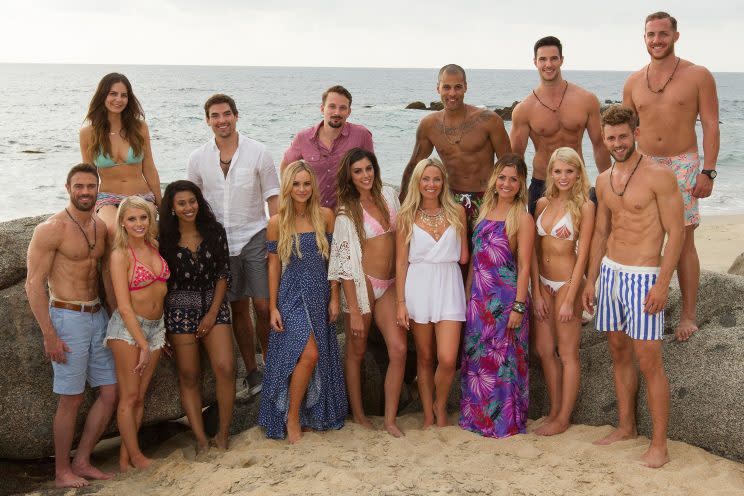What Really Caused ‘Bachelor in Paradise’ to Shut Down Production

On Sunday night, news broke that filming of the reality television show Bachelor in Paradise was suspended after only one week of shooting, due to allegations of “misconduct.” Early reports revealed very little outside of the fact that a producer on the show, a spin-off of the popular rose-loving franchise that includes The Bachelor and The Bachelorette, had filed a third-party complaint against the production.
Over the past 24 hours, more details have begun to emerge about what led to the show halting production and possibly even cancelling the fourth season altogether. A statement made by Warner Bros. and released on Sunday read: “We have become aware of allegations of misconduct on the set of Bachelor in Paradise in Mexico. We have suspended production and we are conducting a thorough investigation of these allegations. Once the investigation is complete, we will take appropriate responsive action.”
Details are still emerging about what exactly that “misconduct” is, but early reports say that it allegedly involves two cast members — Corinne Olympios and DeMario Jackson.
According to reporting done by Amy Kaufman, a writer at the Los Angeles Times who is currently writing a book on The Bachelor, on the first day of filming — June 4 — Olympios and Jackson “got extremely drunk.” Kaufman tweeted all the tips she received from a source — tips that detail what seems tantamount to sexual assault.
On the first day of production, Sunday, DeMario and Corinne got extremely drunk, per my source.
— Amy Kaufman (@AmyKinLA) June 11, 2017
From this point forward, things turned into "soft core porn." They did not have sex. But it was very raunchy.
— Amy Kaufman (@AmyKinLA) June 11, 2017
According to my source, this producer went on to sue the production for misconduct over what she witnessed between DeMario and Corinne.
— Amy Kaufman (@AmyKinLA) June 11, 2017
I will report more as I have it.
— Amy Kaufman (@AmyKinLA) June 11, 2017
My source was told a producer filed a "third party complaint," to clarify my above comment.
— Amy Kaufman (@AmyKinLA) June 11, 2017
TMZ reports that the producer in question claims that Olympios was too drunk to consent to the sexual acts in which she engaged with Jackson, which allegedly involved manual penetration and oral sex. The celebrity news tabloid also reports that several other cast members felt Olympios had been drinking too much and allegedly approached producers regarding their concern for Olympios and her level of intoxication, though several producers told TMZ that this did not occur. Olympios herself is also now saying that she had blacked out and did not consent to sexual activity with Jackson.
TMZ also reports that Jackson says it was Olympios who instigated the events and that he was not able to consummate things with Olympios sexually because of how drunk he was. Jackson also tells TMZ that he and Olympios were fine the day after the alleged event until they were called in by an executive producer and told that a producer on the show had seen the footage of them in the pool and was made “uncomfortable” by it. Of course, it must be noted that Warner Bros. has not confirmed that this unfolding story is the “misconduct” they are looking into.
As for the aforementioned third-party complaint, supposedly it came from the producer who was “uncomfortable.” To understand a little better what’s going on, Yahoo Beauty spoke via email to Maya Raghu, director of Workplace Equality at the National Women’s Law Center (NWLC), in general terms — as the exact details of the Bachelor in Paradise situation remain unclear — to understand what a third-party complaint is. Raghu explained that an employee need not be the specific target of sexual harassment in order to be affected by sexual harassment. And thus a third-party complaint may be filed.
Raghu notes that “witnessing a sexual assault in the workplace context could potentially contribute to a hostile work environment and constitute sexual harassment, depending on the circumstances. Here, the witness/bystander is the third party, and can sue the employer for sexual harassment. Whether the employer is liable depends on the facts of the case.”
The other type of third-party complaint in cases of sexual assault, though, Raghu says, is when a victim of sexual assault brings a civil lawsuit against the perpetrator, as well as a third party (like the employer, or someone who had some responsibility or authority over the perpetrator, or was the owner of the location where the assault occurred).
On Twitter, many Bachelor fans are speculating as to what the nature of the “third-party complaint” might entail — and mean for the series. Of course, Reality Steve has weighed in as well.
For the record, one thing I can report to be 100% true: This season of Bachelor in Paradise isn't happening. It's been cancelled.
— RealitySteve (@RealitySteve) June 12, 2017
As Bachelor in Paradise films in Mexico, there are also questions regarding under whose jurisdiction potential legal recourse may fall.
Raghu tells Yahoo Beauty, “My understanding is that generally, if a company is a U.S. company (created and operating under U.S. law), it must comply with both U.S. law and the law of the foreign country in which it is conducting business. U.S. citizens working for a U.S. employers outside the U.S. are protected by particular American antidiscrimination laws, including those governing sexual harassment.”
There is still a lot to unearth here, but more information is coming in by the minute.
Follow us on Instagram, Facebook, and Pinterest for nonstop inspiration delivered fresh to your feed, every day. For Twitter updates, follow @YahooStyle and @YahooBeauty.
Read more on Yahoo Style + Beauty:
‘The Bachelorette’ Seasons Premiere Recap: Rachel Gets Her Groove On
Twitter Thinks James Comey Hearing Resembled a ‘Date Rape’ Trial


